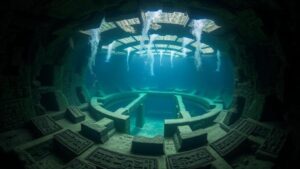Searching for the origin of the “Sea Peoples” who disrupted ancient Mediterranean empires.
The Enigmatic Sea Peoples: Unraveling Their Origins
The Sea Peoples, a confederation of naval raiders, are often cited as one of the most significant factors in the collapse of several ancient Mediterranean civilizations around the 12th century BCE. Their origins remain one of historys enduring mysteries, sparking intrigue among archaeologists and historians alike. This article delves into the theories surrounding their origins, the impact of their incursions, and the lasting legacy they left behind.
Historical Context
Between the late Bronze Age (circa 1500-1200 BCE) and the early Iron Age, the Eastern Mediterranean witnessed a series of unprecedented upheavals. Hittite Empire, once a dominant power in Anatolia, crumbled around 1200 BCE, while Egypt faced significant threats from these marauding groups. This period, often described as the Bronze Age Collapse, set the stage for the emergence of the Sea Peoples.
Who Were the Sea Peoples?
The term Sea Peoples is a modern designation given to a coalition of maritime raiders that attacked and settled in various coastal areas of the Eastern Mediterranean. The Egyptian Pharaoh Ramses III documented his encounters with these groups in texts dating to around 1180 BCE. Sea Peoples included various factions, such as:
- The Philistines: These are believed to be one of the most notable groups, known for settling along the southern coast of Canaan.
- The Sherden: Often depicted as warriors wearing horned helmets, they are thought to have originated from the western Mediterranean.
- The Peleset: Likely associated with the Philistines, they also contributed to the disruption of established societies.
Theories of Origin
The exact origins of the Sea Peoples remain contentious among scholars. Several theories have been proposed:
- Migration due to Climate Change: One significant hypothesis suggests that climatic factors, such as drought or famine, may have spurred migrations from regions like the Aegean and Anatolia. Archaeological evidence indicates a decline in agriculture around the late Bronze Age, pushing populations to seek new livelihoods.
- Trade Disruption: Increased piracy and the disruption of trade networks may have forced communities to resort to raiding. fall of the Hittite Empire, which had facilitated trade between the Eastern Mediterranean and the Aegean, may have created a power vacuum that the Sea Peoples exploited.
- Political Fragmentation: The weakening of major powers like Egypt and the Hittites may have encouraged smaller communities to unite and confront their bigger neighbors, leading to the formation of a coalition of the Sea Peoples.
Significant Attacks and Responses
The Sea Peoples conducted numerous incursions, but a few stand out for their historical significance. One of their most notable campaigns was during Ramses IIIs reign, where they attempted to invade Egypt around 1175 BCE. In the Battle of the Delta, the Egyptians successfully repelled the Sea Peoples, an event documented on the walls of the Medinet Habu temple in Luxor.
This battle exemplifies both the military strategy and the cultural resilience of the Egyptians, who employed innovative tactics such as chariot warfare and heavy fortifications to defend their territory.
The Legacy of the Sea Peoples
The aftermath of the Sea Peoples raids dramatically transformed the sociopolitical landscape of the Mediterranean. r invasions contributed to the collapse of several city-states and empires, leading to a period often referred to as the dark ages. These disruptions also paved the way for the rise of new powers, including the Phoenicians and the Israelites.
Conclusion: The Unsolved Mystery
Today, the origin of the Sea Peoples continues to spark debate and research. Despite various hypotheses, definitive proof remains elusive, and their story serves as a reminder of the complexities of migration, trade, and conflict in ancient history. The legacy of the Sea Peoples is a testament to their impact on the Mediterranean world, influencing generations that followed.
Actionable Takeaways
- Explore further studies on climatic changes in the Late Bronze Age, examining their potential impact on migration.
- Investigate archaeological sites in the eastern Mediterranean that may provide insights into the settlements and activities of the Sea Peoples.
- Consider the role of trade and economy in understanding the socio-political transformations of ancient civilizations.

